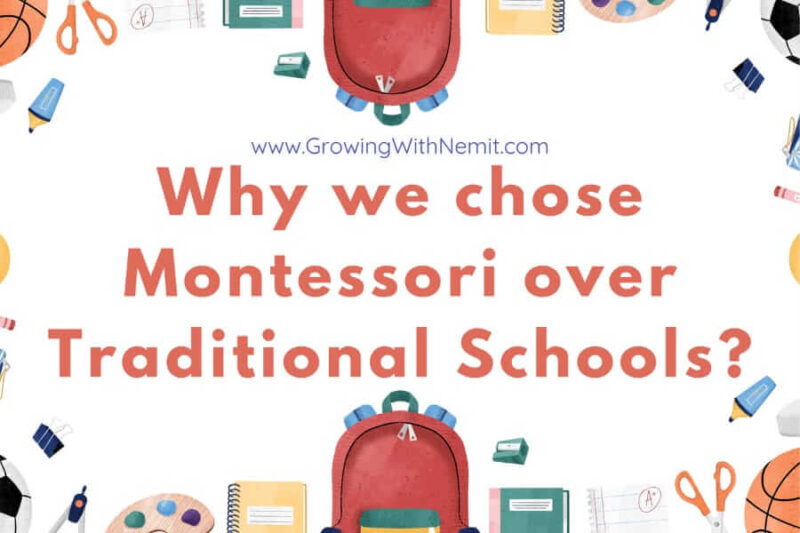Montessori Over Traditional Schools
Hello everyone, hope you all are doing good! I am writing almost after a month on the blog, and oh, I missed this so much. But a lot had been going on in my mind regarding the content that I want to put out here. So, this time I want to take up a few topics which are really close to my heart and I want to share my experience and learnings about the same. Today’s post is part of one of the series I am starting on the blog and we will call it #OurMontessoriAdventures. And, I want to start it with the topic ‘Why we chose Montessori over Traditional schools?’
I want to take you on a personal journey, sharing why my husband and I chose Montessori education for our 6-year-old son over traditional schools.
Buckle up as we dive into the exciting world of Montessori magic!
Online Classes to Offline School
When our little one first started school in 2020, we were quite hopeful about his educational journey. But then, the pandemic struck, and online classes became the new norm. It was a rollercoaster of emotions, juggling work from home and helping our son navigate this virtual learning world.
Check out this fun video we made about parents during online classes-
As schools slowly reopened in 2022, we were thrilled at the thought of our boy going to explore the offline school, meeting his friends and teachers for the first time and not through the digital screen.
However, the reality turned out to be quite different. His school seemed to have forgotten that kids are, well, kids!
Children were made to sit for hours on end, lessons after lessons, without even a tiny break. Imagine being discouraged from using the washroom or refilling water bottles – it broke our hearts!

Image Source – Pexels
Our son came home drained and demotivated, dreading the next school day. To top it off, we received frequent complaints from his teachers about his restless behavior in class. Our little chatterbox found it challenging to sit in one place, preferring to chat with friends instead of paying attention to lessons.
You may ask what’s the big deal here?
Thousands of kids all over the country are part of such an education system and still they are doing fine. This is how it has been forever, isn’t it?
I have questioned myself again and again why all this is making me worried. Am I being paranoid for no reason. Am I being over protective? What if I am being irrational by questioning the traditional teaching environment? I have grown up being a part of such conventional learning and I turned out fine. I loved my school and my teachers.
But hello, are we forgetting that each child is unique! The times now have changed!
I may have turned out fine but there are many who suffer each day every day. Because they have no other alternative.
My son is not me! This thought struck me hard. I have always believed in the child led learning, easy going approach, let the child be a child and making learning fun.
So, why am I now failing at the hands of traditional teaching? When I know clearly this is not what I believe in and it is not the best for my child.
After a month of going back and forth with my thoughts, I realized that I was not alone in this. There were other parents who were also going through the same dilemma. There were long chats, basically vent outs, daily in the school moms’ group. Nobody was happy with what our children were going through at school. But nobody knew the way out.
That’s when we knew we had to find a better way for our son to learn and thrive. After a lot of research and soul-searching, we stumbled upon the Montessori method of education for elementary. The more we read about it, the more it felt like a breath of fresh air!
Montessori classrooms were all about nurturing the child’s curiosity, independence, and joy for learning.

Image Source – Lamplighter Montessori School
I was already aware of Montessori way of teaching and learning as I have followed a lot of their principles at home when Nemit was a toddler. Even his pre-school was following the similar philosophy focusing on multiple intelligence, inquiry based learning and experiential learning.
What helped us in our decision was an opportunity to relocate to Bangalore, the city known for some of the best alternative schools in the country.
With butterflies in our stomachs, we took the leap and enrolled our son in a Montessori school in Bangalore in June 2022. The moment he stepped into that child-centric environment, we knew we had made the right decision.
9 Reasons for Choosing Montessori over Traditional Schools
In Montessori school, our son experienced a world of freedom and exploration. The classroom was like a mini wonderland, filled with materials that sparked his imagination. Here are our 9 reasons that made us choose Montessori over Traditional schools at first glance. Our son joined the Montessori in Elementary Grade 2.
1 – Montessori classrooms don’t have any structured layout and seating arrangement. The children are not expected to sit at one place for the whole day. They can choose wherever they want to sit and they can choose whatever they want to learn.
2 – The role of the teacher in a Montessori environment is of an observer, guide or mentor. The teacher helps the child only if the child needs help or asks for guidance. There is no set curriculum and no lectures delivered.
3 – In Montessori, they follow an uninterrupted 3-hour work cycle which is the time when the child chooses the activity or topic he wants to learn and explore. If the child wants to continue with single subject, they are not disturbed during their work.
4 – Children in a Montessori environment are not expected to ask for permissions for loo breaks or water breaks. They can tend to their needs without worrying about the teacher’s reaction.
5 – Montessori classrooms typically have mixed-age groups, allowing younger children to learn from older peers and older children to reinforce their knowledge by helping younger ones. This creates a supportive and collaborative learning environment.
You may also read: Role of Play-Based Learning in a Child’s Development!
6 – There is no concept of rote learning and memorization in Montessori. Children work with special materials which facilitate the child’s exploration, understanding, and mastery of various concepts.
7 – Montessori education gives equal focus on extra-curricular activities. Along with sports and arts, they also include gardening, cooking, outdoor exploration, community service and social awareness.
8 – Montessori schools don’t expect parents or external tutors to teach children or help them with their homework, if there’s any. There is no burden of homework, assignments, projects, etc.
9 – There’s no concept of reward or punishment in Montessori. Instead of resorting to punishments or harsh discipline, Montessori teachers use encouragement and positive reinforcement to guide children toward making better choices.
The reason to choose Montessori over Traditional schools goes beyond academics.
Sure, the transition wasn’t without its challenges. As parents who grew up in conventional schools, we had to unlearn some preconceived notions. I will talk about this and many other things we are learning about Montessori education in my upcoming posts.
If you are someone who is in a dilemma whether to choose a regular school for your child or go for other alternative options; I would say do check other options too.
In the end, all we want as parents is to see our children flourish, and only you are the right judge of what will suit your child’s need. So, take your time, do some research, understand what will work best for your child and then take a decision.
This is Part 1 of #OurMontessoriAdventures Blog Series. I will meet you soon with another Montessori related topic. Meanwhile, if you have any questions regarding Montessori system, you may write them down in the comments below.
You may read Part 2 here: Debunking Montessori Myths for Elementary Education!


Leave A Comment